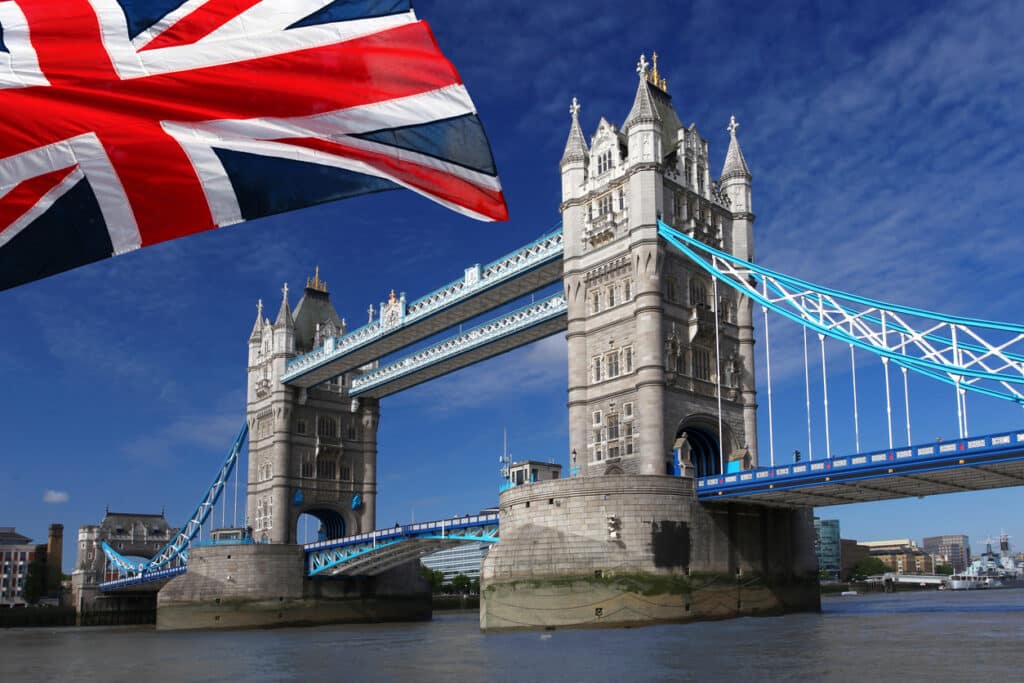From chasing career dreams in London to enrolling at a centuries-old university—or maybe just following your heart across the pond—there are plenty of reasons Americans are packing up and moving to the UK from the USA.
Unlike hopping to Canada or heading somewhere with year-round sun, moving to the United Kingdom comes with its own unique blend of charm, quirks, and red tape. Think: learning to drive on the other side of the road, discovering that “pants” means something entirely different, and navigating a visa process with more steps than a double-decker bus.
Expect British bureaucracy, world-class scones, and a culture that’s both familiar and just foreign enough to keep you on your toes. Here’s what to know about the UK immigration process—and what life really looks like when you swap U.S. hustle for UK style.
📋 Key Updates for 2025
- As of January 2025, all U.S. citizens—including expats—need a £16 Electronic Travel Authorisation (ETA) for short visits to the UK (valid two years).
- In April 2025, UK visa fees rose by £50–£99 and ILR fees increased by about £144, raising moving costs for expats.
- HMRC clarified in 2025 that lump-sum withdrawals from U.S. pensions are now taxable in the UK, but U.S. taxes paid can be claimed as a credit.
Visas and immigration: Navigating your options
Before you start picturing yourself strolling through Hyde Park or ordering fish and chips with confidence, you’ll need to crack the UK visa process. The UK government offers plenty of routes for Americans making the leap from New York (or anywhere in the States) to British life—each with its own rules and paperwork quirks.
- Skilled worker visa: The classic route for most professionals. You’ll need a job offer from a UK employer, a minimum salary (set by visa category), and a certificate of sponsorship. Bonus points if you can decode all the Home Office lingo on your first try.
- Family visas: For those joining a spouse, partner, or family member who’s already a British citizen or permanent resident. Think: marriage, civil partnership, or bringing dependents along for the ride.
- Student visa: Planning to hit the books? The UK’s world-renowned education system welcomes U.S. students who meet eligibility and course requirements, plus have a confirmed offer from an approved institution.
- Other visa options: Got a British grandparent? The Ancestry visa could be your golden ticket. There are also Investor visas, Global Talent visas, and short-term permits for specific work visas or travel needs.
- Indefinite Leave to Remain (ILR): After living in the UK for a set period (usually five years), you can apply for Indefinite Leave to Remain or ILR—a fancy term for permanent residency. From there, you’re on the path to a full-fledged British passport and citizenship.
No matter your visa category, the process requires patience, paperwork, and occasionally a cup of strong British tea. For American expats, getting the right UK visa is the first real step toward turning your expat daydream into your next big adventure.
What life in the UK really costs
So, you’ve got your visa application sorted and your type of visa approved—what’s next? It’s time to face the great British reality: the cost of living.
- City living: London is famously pricey (think New York with more rain), but cities like Manchester, Birmingham, and Edinburgh offer a more manageable cost of living—especially in Scotland’s university towns, where student life keeps prices (somewhat) in check.
- Rent and housing: Average monthly rent varies wildly by location and property type. In London, expect to pay a king’s ransom for a modest flat, plus a security deposit (usually five weeks’ rent). Expats often face extra requirements, like showing your residence permit and visa paperwork to secure a lease.
- Banking and currency: Setting up a UK bank account is essential for handling daily expenses and getting paid in pounds instead of dollars. Don’t forget to factor in exchange rates (USD/GBP) and potential fees when transferring money across the pond.
- Monthly expenses: Beyond rent, your budget should cover utilities, council tax, groceries, and National Insurance contributions. The immigration health surcharge is another upfront cost for expats, granting you access to the NHS but adding to your initial expenses.
💡 Pro Tip:
The UK loves paperwork—biometric appointments, visa renewals, and proof of income are part of the expat starter pack. Keep your documents handy to smooth the process of opening accounts, renting, and staying compliant.
Healthcare: Using the National Health Service (NHS) as a U.S. citizen
Welcome to a land where doctor’s visits won’t leave you clutching your wallet—but the paperwork might have you clutching your head.
- Registering for the NHS: Most visa holders are eligible to use the NHS after paying the immigration health surcharge. Your first step is finding and registering with a local general practitioner (GP), who’ll be your gateway to UK healthcare.
- What’s covered: NHS registration gives you access to doctor visits, hospital care, emergency services, and prescriptions (with a small fee). Dental and vision coverage are limited, so many expats choose to supplement with private insurance for extras or faster appointments.
- New arrivals and visa holders: If you’re on a valid visa and have paid the surcharge, you can use the NHS almost like a local—though expect some quirks (appointment wait times are real) and possible out-of-pocket costs for certain services.
- Private insurance: For those who want more choice, shorter waits, or expanded dental and vision care, private health insurance is widely available (and sometimes required by employers).
- NHS vs. U.S. healthcare: No massive bills, no need for green card-level paperwork, and no insurance negotiations at every turn—just a bit more waiting, and a healthcare system that runs on national insurance numbers instead of credit cards.
The NHS isn’t perfect, but for most American expats, it’s a relief compared to U.S. healthcare costs—just be ready for a different set of rules and expectations.
💡 Pro Tip:
Register with a GP as soon as you settle in—having a local doctor on file makes everything from getting prescriptions to booking specialist appointments much smoother (and keeps you from scrambling in case of an emergency).
Family, everyday life, and settling in
Once you’ve landed, the real adventure begins—getting your new life running smoothly in the UK.
- Getting set up: Setting up utilities, broadband, and a mobile plan can take a bit of patience (and paperwork). Comparison websites are your friend, and don’t be surprised if you’re asked for proof of address or a UK bank account to get started.
- Building your village: American clubs, expat families, and online forums make it easy to meet fellow U.S. expats—plus, the British are famously friendly once you break the ice. Local community groups and children’s activities can help you settle in faster.
- Cultural quirks: From standing in line (queueing is a national sport) to apologizing for absolutely everything, British etiquette is a learning curve. Expect smaller homes, lots of public transport, and new slang in daily conversation.
- Getting around: Public transport in London, Manchester, and Edinburgh is extensive, reliable, and sometimes bewildering at first—download the local transport apps for a smoother ride. If you want to drive, you’ll need to swap your U.S. license for a UK one after your first year.
💡 Pro Tip:
Embrace public transport early—it’s efficient, cost-effective, and often the fastest way to learn your new city’s rhythms (plus, you’ll get to eavesdrop on some classic British banter).
Working in the UK: What to expect as an American
Landing a job in the UK isn’t just about dusting off your resume—you’ll need to master both the paperwork and the local quirks.
- Getting hired: Most Americans need a job offer from a UK employer willing to sponsor their work visa. Eligible roles must meet salary and skill requirements set by the Home Office—so double-check your job description before making the leap.
- Job hunting tips: LinkedIn is big here, and local recruiters can help open doors. Expect a more formal application process and detailed employment contracts. The infamous British “stiff upper lip” might show up in meetings, but tea breaks and pub chats are just as important for building work relationships.
- Salary and benefits: Salary ranges vary by sector and city. Don’t forget UK residency status and National Insurance contributions will affect your paycheck—plan for regular deductions alongside your taxes.
- Taxes and financial planning: As a U.S. expat, you’ll need to juggle UK income taxes and continued IRS filing requirements back home. Double taxation is possible, but the UK–US tax treaty and smart financial planning can help you avoid paying more than your fair share.
💡 Pro Tip:
Get familiar with your UK employment contract—it often spells out everything from vacation days to pension contributions and notice periods, which can look quite different from U.S. norms.
Education and schooling options
Moving with kids? The UK offers a variety of education pathways for U.S. expat families—just expect a learning curve (for everyone).
- UK education system: Children typically start with primary school, move to secondary, and can later attend college or university. Entry points and grade names are different from the U.S., so take time to learn the lingo.
- Local vs. international schools: You can choose between local state schools (often free for residents) and private or international schools, which follow U.S. or international curricula. Application requirements usually include proof of address, your child’s previous school records, and, in some cases, your visa or residence permit.
- Regional differences: School systems vary across the UK—Scotland, England, and Wales each have their own approaches and academic calendars. Major cities often have more international school options and extracurricular activities.
- Settling in: British curricula may feel more specialized early on (think A-levels or Scottish Highers), but many schools provide support for international students and new arrivals adjusting to a different system.
💡 Pro Tip:
Apply to schools early—popular local and international schools can fill up fast, and having your paperwork ready will make the enrollment process much smoother.
Taxes, banking, and financial planning
When you’re moving to the UK from the USA, your financial checklist gets a lot longer—but staying organized now pays off later.
- Tax time, double edition: U.S. citizens in the UK must file a UK tax return (if required) and continue filing annual U.S. tax returns with the IRS—even if you don’t owe tax back home. Remember, the UK tax year runs April to April, while the U.S. tax year is the standard calendar year—so expect extra paperwork and a few new deadlines.
- Banking basics: Opening a UK bank account makes daily life easier, but you’ll also need to report most foreign accounts to the IRS (hello, FBAR and FATCA). Building UK credit history can take time, so keep old U.S. credit cards active if possible.
- Planning for the future: Get familiar with National Insurance (the UK’s version of Social Security) and how your retirement savings will be treated in both countries. The U.S.-UK tax treaty is your friend when it comes to avoiding double taxation—but only if you file correctly.
- Key deadlines and compliance: Mark all major tax deadlines on your calendar and keep records for both countries. Late or missing filings can mean penalties, even if you’re living thousands of miles from the IRS.
💡 Pro Tip:
Don’t try to figure it all out alone—cross-border tax and banking rules are famously complex, and the mismatch between U.S. and UK tax years only adds to the fun. Working with a specialist can save you money, time, and a lot of headaches down the line.
Your New UK Adventure Awaits
Moving to a new country isn’t just paperwork—it’s tea, traffic, weather talk, and discovering which biscuits pair best with your cuppa. As an American in the UK, you’ll face culture shocks, new systems, and yes, a few surprise taxes.
The upside? With some planning (and the right help), you can dodge most headaches and dive into British life with confidence. Stay organized, ask questions, and remember—every expat mishap makes a great pub story.
Need help with taxes as you settle in? Bright!Tax is here to keep you compliant, save you money, and make your UK move smoother (with extra scones on the side). Get in touch today and enjoy your new home stress-free.
Frequently Asked Questions
-
Do I need a visa to move to the UK from the USA?
Yes, U.S. citizens need an appropriate UK visa to live, work, or study in the UK. The type you need depends on your job, studies, or family situation.
-
What’s the cost of living like in the UK compared to the USA?
It depends on the city—London is famously expensive, while places like Manchester and Edinburgh are more affordable. Be ready for different rent, grocery prices, and (surprise!) council tax.
-
Can I use the NHS as an American expat?
If you’re in the UK on a valid visa and have paid the immigration health surcharge, you’ll have access to the NHS much like a local. Bring your patience for wait times and register with a GP early.
-
Will I have to pay taxes in both countries?
Most likely, yes. U.S. citizens must file U.S. tax returns no matter where they live, and you may owe UK taxes too. The U.S.–UK tax treaty and credits can help prevent double taxation—but you’ll still have extra forms to fill out.
-
How do I open a UK bank account as a newcomer?
Bring proof of address (a rental contract or utility bill), your passport, and your visa or residence permit. Some banks offer special “new to the UK” accounts for expats.
-
What’s different about UK schools for American kids?
School years and grade names differ, and the curriculum may feel more specialized. Local and international schools both exist, but apply early—spaces can fill up fast.
-
Can I drive in the UK with my U.S. license?
Yes, for up to 12 months. After that, you’ll need to swap your U.S. license for a UK one (and maybe relearn to drive on the left).
-
What documents should I keep handy after I move?
Passport, visa, proof of address, tax records, and anything from the Home Office. Paperwork is practically a British pastime.
-
Do I need private health insurance?
Not required for most, but some expats choose it for shorter wait times or extra coverage (like dental and vision).
-
What’s one thing most Americans wish they’d known before moving?
That “pants” means underwear and “chips” mean fries—and that the tax years don’t match up. But don’t worry, you’ll learn fast!

 Connect on LinkedIn
Connect on LinkedIn

